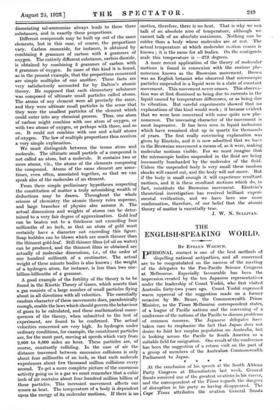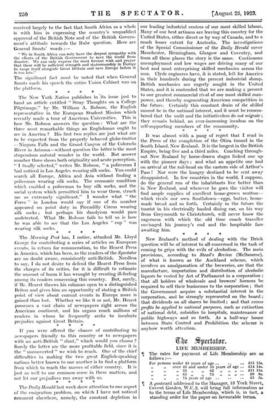THE
ENGLISH-SPEAKING WORLD.
BY EVELYN WRENCH.
pERSONAL contact is one of the best methods of dispelling national antipathies, and all concerned are to be congratulated on the success of the meeting of the delegates to the Pan-Pacific Science Congress at Melbourne. Especially favourable has been the impression created by the ten Japanese representatives under the leadership of Count Yoshii, who first visited Australia forty-two years ago. Count Yoshii expressed warm approval of the suggestion made on a former occasion by Mr. Bruce, the Commonwealth Prime Minister, so the Times Melbourne correspondent states, of a league of Pacific nations and the convening of a conference of the nations of the Pacific to discuss problems of common concern. The Japanese delegates have taken care to emphasize the fact that Japan does not desire to foist her surplus population on Australia, but is looking across the Pacific to South America as a suitable field for emigration. One result of the conference has been the suggestion of a return visit on the part of a group of members of the Australian Commonwealth Parliament to Japan.
At the conclusion of his speech at the South African Party Congress at Bloemfontein Just week, General Smuts received one of the greatest ovations in his career, and the correspondent of the Times regards the dangers of disruption in his party as having disappeared. The Cape Times attributes the ovation General Smuts received largely to the fact that South Africa as a whole is with him in expressing the country's unqualified approval of the British Note and of the British Govern- ment's attitude towards the Ruhr question. Here are General Smuts' words :-- " We in South Africa can only have the deepest sympathy with the efforts of the British Government to save the world from disaster. We can only express the most fervent wish and prayer that there will be sufficient strength and statesmanship in Europe to range itself alongside Great Britain and save Europe before it is too late."
The significant fact must be noted that when General Smuts made his speeeh the entire Union Cabinet was on the platform.
The New York Nation publishes in its issue just to hand an article entitled "Stray Thoughts on a College Pilgrimage," by Mr. William A. Robson, the English representative in the European Student Mission which recently made a tour of American Universities. This is how Mr. Robson answers the question : What are the three most remarkable things an Englishman ought to see in America ? His first two replies are just what are to be expected from the properly behaved globe-trotter —Niagara Falls and the Grand Canyon of the Colorado River in Arizona—without question the latter is the most stupendous natural wonder in the world. But answer number three shows both originality and acute perception. " I finally selected," writes Mr. Robson, "a policeman I Sad noticed in Los Angeles wearing silk socks. You could search all Europe, Africa and Asia without finding a policeman wearing silk socks. The economic condition which enabled a policeman to buy silk socks, and the social system which permitted him to wear them, struck me as extremely significant." I wonder what "the Force" in London would say if one of its number appeared on point duty in Piccadilly Circus wearing silk socks ; but perhaps his dandyism would pass undetected. What Mr. Robson fails to tell us is how he was able to see that the Los Angeles " cop " was wearing silk socks.
The 3Iorning Post has, I notice, attacked Mr. Lloyd George for contributing a series of articles on European events, in return for remuneration, to the Hearst Press in America, which has been, as the readers of the Spectator are no doubt aware, consistently anti-British. Needless to say, I do not desire to defend the Hearst Press from the charges of its critics, for it is difficult to estimate the amount of harm it has wrought by creating ill-feeling among its readers concerning this country. But, surely, if Mr. Hearst throws his columns open to a distinguished Briton and gives him an opportunity of stating a British point of view about current events in Europe more is gained than lost. Whether we like it or not, Mr. Hearst possesses a vast chain of newspapers right across the American continent, and his organs reach millions of readers in whom he frequently seeks to inculcate prejudice against Great Britain.
If you were offered the chance of contributing to newspapers friendly to this country or to newspapers with an anti-British " slant," which would you choose ? Surely the latter are the more profitable field, since it is the " unconverted " we wish to reach. One of the chief difficulties in making the two great English-speaking nations better known to one another is to find a platform from which to reach the masses of either country. It is just as well to use common sense in these matters, and not let our prejudices run away with us.
The Daily Herald last week drew attention to one aspect of the emigration problem, on whi•.:h I have not noticed comment elsewhere, namely, the constant depletion in our leading industrial centres of our most skilled labour. Many of our best artisans are leaving this country for the United States, either direct or by way of Canada, and to a much lesser extent for Australia. The investigations of the Special Commissioner of the Daily Herald cover Manchester, Birmingham, Glasgow and Coventry, and from all these places the story is the same. Continuous unemployment and low wages are driving many of our best and most enterprising skilled mechanics across the seas. Clyde engineers have, it is stated, left for America in their hundreds during the present industrial slump. British mechanics are eagerly sought in the United States, and it is contended that we are making a present to our greatest commercial rival of our most skilled man- power, and thereby augmenting American competition in the future. Certainly this constant drain of the skilled cannot be in the national interest, and it must be remem- bered that the unfit and the initiativeless do not migrate ; they remain behind, an ever-increasing incubus on the self-supporting members of the community.
It was almost with a pang of regret that I read in the Press of the completion of the Otira tunnel in the South Island, New Zealand. It is the longest in the British Empire, being five and a third miles. Coaching through- out New Zealand by horse-drawn stages linked one up with the pioneer days ; and what an appetite one had on arrival at the rail-head on the eastern side of Arthur's Pass ! Nor were the hungry destined to be sent away disappointed. In few countries in the world, I suppose, do the general run of the inhabitants live better than in New Zealand, and wherever he goes the visitor will find ample supplies of excellent home-grown mutton— which rivals our own Southdown—eggs, butter, home- made bread and so forth. Certainly in the future the tourist in his electrically hauled dining car, on his way from Greymouth to Christchurch, will never know the eagerness with which the old time coach traveller envisaged his journey's end and the hospitable fare awaiting him.
New Zealand's method of dealing with the Drink question will be of interest to all concerned in the task of coming to grips with the evils of alcoholism. The main provisions, according to Stead's Review (Melbourne), of what is known as the Auckland scheme, which involves an amalgamation of the breweries, are that the manufacture, importation and distribution of alcoholic liquors be vested by Act of Parliament in a corporation ; that all holders of wholesale and brewers' licences be required to sell their businesses to the corporation ; that the Government acquire a substantial interest in the corporation, and be strongly represented on the board ; that dividends on all shares be limited ; and that excess profits be applied to national purposes, such as extinction of national debt, subsidies to hospitals, maintenance of public highways and so forth. As a half-way house between State Control and Prohibition the scheme is anyhow worth attention.



































 Previous page
Previous page